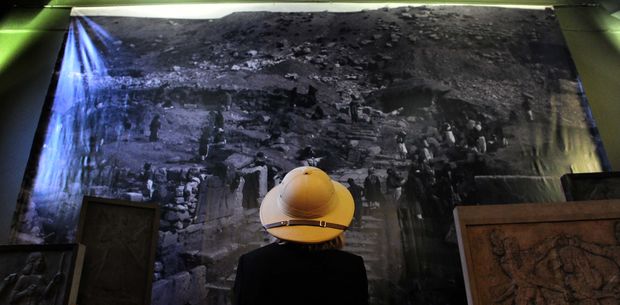
At its centre is an exact recreation of the kind of base archaeologists would have used in the desert right up to the 1930s – although without the supernatural perils that plagued Harrison Ford’s Dr Indiana Jones in the hit series of films.
It recreates the time when Liverpool University professor John Garstang was working with TE Lawrence – later the soldier, Lawrence of Arabia – researching the ancient Hittite civilisation, in modern Turkey.
Professor Garstang put much of his work on display in Liverpool Museum, only to see it take a direct hit in the May Blitz of 1941.
Archaeologists had to start work on a second excavation, to salvage what they could from the wreckage. Most of it has remained in storage until the new show, entitled The Lost World of the Hittite Empire, opens to the public from tomorrow at the Victoria Gallery and Museum, Brownlow Hill.
Dr Alan Greaves, of Liverpool University, and project leader for the exhibition, said: “Many great civilisations bloomed in the ancient Near East and there was a sophisticated culture of diplomacy between them. However, the Hittites had been almost completely forgotten until the work of John Garstang.”
The Hittites were an important ancient people who lived in what is now modern Turkey and Northern Syria. Their empire was the chief power and cultural force in Western Asia and flourished from 1600 to 1200 BC.
The Hittites are named in the Bible as a great military force, but are best known for having fought the world’s largest chariot battle with the Egyptians in about 1274BC.
The battle, at Kadesh, in modern Syria, ended in a stalemate when the Hittites and the Egyptians signed the world’s first ever peace treaty.
The Hittites are thought to have been the first civilisation to smelt iron and were experts at crafting weapons.
They eventually fell victim to the little-known Sea People, who roamed the eastern Mediterranean, and the Hittite civilisation finally faded out to be replaced by the first Greeks.
Professor Garstang worked on digs in the area over a 50-year period, from the 1890s to the 1940s, and was professor at Liverpool, University from 1907 to 1941.
Dr Greaves said: “It’s thanks to his work that the conservation laws in both Israel and Jordan are in place now and also that Liverpool is an important centre of Near East archaeology today, up there with centres like Oxford and Cambridge.”
As well as exhibits of Hittite culture there will be the chance for visitors to try on modern reproductions of Hittite battle dress as well as the traditional pith helmets worn by westerners unused to the fierce sun of the region.
Author: William Leece | Source: Liverpool Daily Post [May 27, 2011]